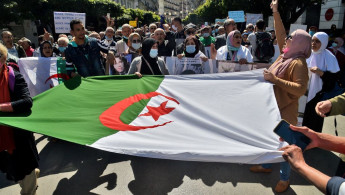UN envoy paints a grim scene of human rights in Algeria
A UN envoy to Algeria has released a grim report on human rights in the North African state after meeting with several local activists, journalists, and human rights defenders.
"I have been disturbed to hear from many journalists, bloggers and social media users who publish information on human rights violations that they feel they take great risks each time they make a post or write an article," wrote Mary Lawlor, a UN Special Rapporteur on the situation of human rights, in her end-of-mission statement.
On 25 November, Lawlor kicked off her visit to Algeria upon an official invitation from the country's government.
Over ten days, the UN special envoy met with fifty human rights defenders in Algiers, Tizi Ouzou and Oran, with many cancelling their meeting at the last minute for fear of reprisals or after getting arrested on their way to the meeting.
Ma visite officielle en #Algérie étant désormais terminée, je partage ici mes observations préliminaires ainsi que mes recommandations sur la situation des défenseurs des droits humains dans le pays:https://t.co/b6qRLXx6Si
— Mary Lawlor UN Special Rapporteur HRDs (@MaryLawlorhrds) December 5, 2023
"My visit was also overshadowed by a number of human rights defenders and victims of human rights violations being prevented from reaching Tizi Ouzou while I was there," said Lawlor in her report, published on Tuesday, 5 December.
"As they travelled to the city, they were either stopped at checkpoints or detained in a police station for over ten hours," she added.
The visit focused on assessing the human rights situation in Algeria in light of reports indicating harassment and judicial pursuits targetting several human rights defenders and journalists.
The UN envoy's report cited four methods the Algerian government employed to restrict the activities of human rights defenders in Algeria, including continuous judicial harassment, dissolution of human rights organisations, restrictions on their freedom of movement and travel bans.
The report also urged the Algerian Minister of Justice, Hafidh Al-Akram, to review and amend the infamous Article 87 of the penal code, a broad anti-terrorism law "loosely" interpreted over the past years to trial journalists and activists in the North African country.
"To the government of Algeria: Release all human rights defenders imprisoned for the exercise of their freedom of expression, opinion and association," added Lawlore in her report.
There are some 250 prisoners of conscience in the country, and many of them are facing terrorism charges for criticising politicians or supporting online anti-regime protests.
Last November, world-leading powers lambasted the North African state at the Human Rights Council (HRC) for prosecuting activists and journalists under an "overbroad" terrorism law.
Lawlor's visit is the third UN envoy visit to Algeria this year. A fourth one is scheduled before the end of this year as UN Special Rapporteur on Freedom of Expression Ahmed Shaheed is preparing to visit Algeria in December.
Despite previously shunning visits from international observers, Algeria opened its doors to UN envoys after its recent election as a UN Human Rights Council member for next year.
In 2019, Algerians toppled the two-decade-long-regime of Bouteflika, envisioning a future where the criticism of politicians would not be censored. The Algerian path to democracy was soon sabotaged by a new regime under current president Abdelmadjid Tebboune.
Four years on the Hirak, activists say Algeria is "moonwalking to a darker era" than Bouteflika's period.





 Follow the Middle East's top stories in English at The New Arab on Google News
Follow the Middle East's top stories in English at The New Arab on Google News


